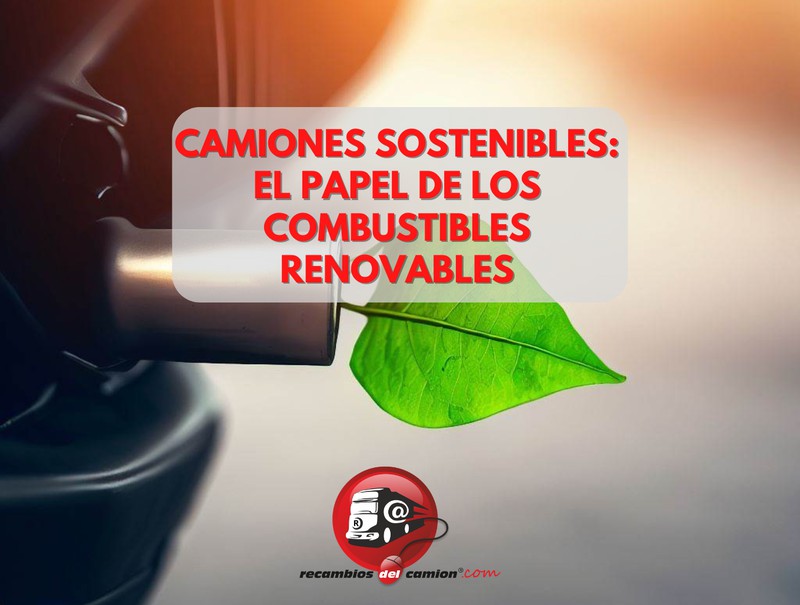Sustainable trucks: the role of renewable fuels
Road freight transport is a key part of the global economy, but also one of the main contributors to CO₂ emissions. The search for solutions to mitigate the environmental impact of this sector is essential, and renewable fuels are positioning themselves as one of the most viable alternatives in the short term. In this article, we will delve into how renewable fuels represent an immediate response to the challenge of reducing emissions in truck transport and why their adoption is crucial in the transition towards a more sustainable future.

Transport is responsible for a significant portion of greenhouse gas emissions worldwide, and within this sector, trucks that transport goods contribute significantly due to their dependence on diesel and other fossil fuels. Although electrification and hydrogen are emerging as long-term solutions, both still have significant technological, economic and logistical barriers to mass implementation in the heavy truck sector.
In this context, renewable fuels stand out as an immediate option that can reduce emissions without the need to wait for major transformations in infrastructure or vehicles.
Renewable fuels are an alternative to traditional fossil fuels that are produced from sustainable feedstocks such as agricultural waste, used vegetable oils or biomass. These fuels have the ability to significantly reduce CO₂ emissions as they absorb carbon during their life cycle and then release it during combustion. Examples include biodiesel, bioethanol and renewable natural gas.
Unlike other emerging technologies, renewable fuels can be used in existing diesel engines without major modifications, making them a viable and quick-to-implement solution for existing truck fleets.
1. Immediate emissions reduction
One of the biggest benefits of renewable fuels is that they allow for a direct reduction in CO₂ emissions without the need to wait for full electrification of the sector. For example, it is estimated that biodiesel can reduce greenhouse gas emissions by up to 80% compared to conventional diesel. This reduction is essential to meet short-term climate goals, as decarbonizing heavy transport is one of the major challenges facing the industry.
2. Compatibility with existing infrastructure
Another major advantage of renewable fuels is their compatibility with existing infrastructure. Truck fleets that use diesel engines can transition to renewable fuels without needing to change their vehicles or make costly modifications. This means that adoption of these fuels can be almost immediate, allowing transport companies to continue operating with their current assets while reducing their carbon footprint.
3. Reduced dependence on oil
Renewable fuels help reduce dependence on fossil fuels and oil, which has both economic and geopolitical implications. As oil prices fluctuate and security of supply becomes more uncertain, renewable fuels offer a more stable and sustainable source of energy, contributing to long-term energy security.
4. Boosting the circular economy
Using sustainable feedstocks such as agricultural waste or recycled oils to produce renewable fuels encourages a circular economy in which waste is converted into valuable resources. This approach not only reduces emissions, but also promotes greater efficiency in the use of available resources and minimises waste ending up in landfills.
Despite their numerous advantages, renewable fuels also face certain challenges that must be overcome to achieve widespread adoption in road freight transport. Some of these challenges include:
1. Limited production and costs
Although the technology to produce renewable fuels is advanced, current production is not sufficient to meet global demand in the transport sector. In addition, production costs are still relatively high compared to fossil fuels. However, it is expected that as investment in this sector increases and new technologies are developed, costs will decrease and production will increase.
2. Competition with other sectors
The use of raw materials such as agricultural waste to produce renewable fuels competes with other sectors that also need them, such as the food industry or power generation. This poses a challenge in ensuring a sufficient supply of raw materials for the production of these fuels without negatively impacting other areas.
3. Regulations and policies
For renewable fuels to be adopted on a large scale, a clear regulatory framework and policies that encourage their use are necessary. This includes everything from subsidies for biofuel production to carbon taxes that make fossil fuels less economically attractive.
While renewable fuels are not a definitive solution for the decarbonisation of road freight transport, they represent a key tool in the transition towards a more sustainable transport system. As technologies such as electric or hydrogen trucks mature and become more affordable, renewable fuels enable immediate emissions reductions and offer a viable option for those fleets that cannot afford to make drastic changes in the short term.
The implementation of renewable fuels not only contributes to the fight against climate change, but also strengthens energy resilience and promotes a more circular and sustainable economy. Transport companies and governments must collaborate to accelerate the adoption of these fuels and take advantage of the benefits they offer on the path to carbon neutrality.
Reducing emissions in freight transport is one of the great challenges of our time, and renewable fuels are one of the most immediate and practical responses to address this problem. Although they are not a perfect solution, their ability to integrate into current infrastructure and their potential to reduce emissions make them an essential option in the short and medium term.
In the future, we are likely to see a combination of technological solutions including both electric and hydrogen-powered vehicles and the continued use of renewable fuels. However, it is vital that we start implementing solutions that are available today, and renewable fuels are one of the most effective and viable options to meet the urgent challenge of reducing emissions in road transport.
The transition to cleaner transport is a long road, but every step counts, and renewable fuels represent a significant step towards the ultimate goal of a carbon-neutral transport sector.





Receive our news